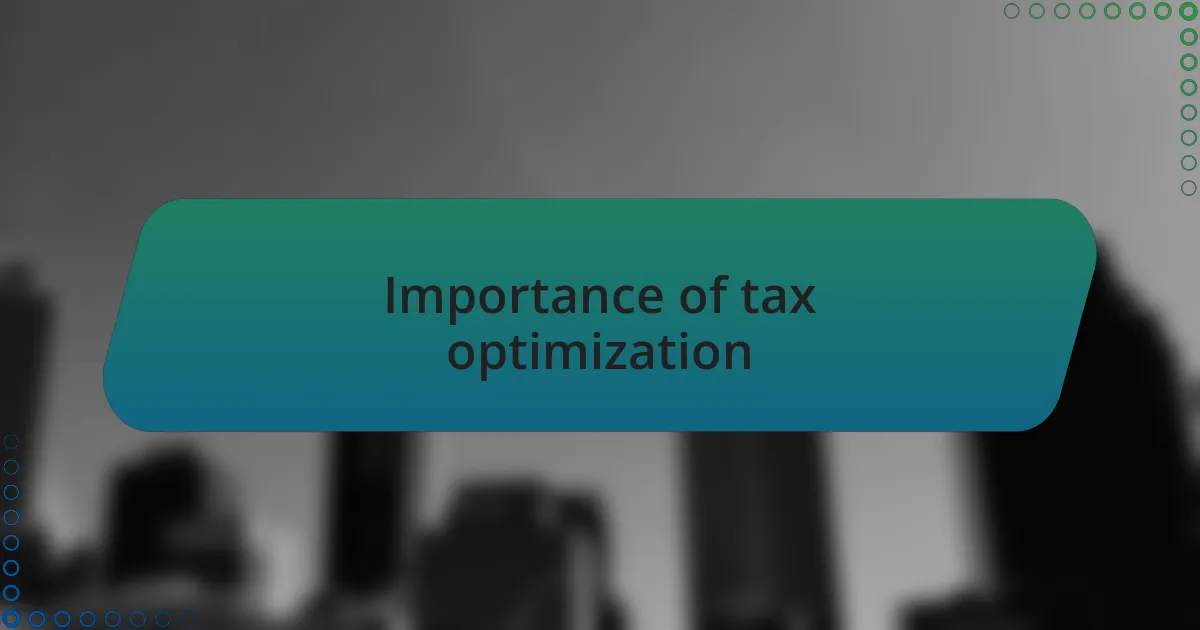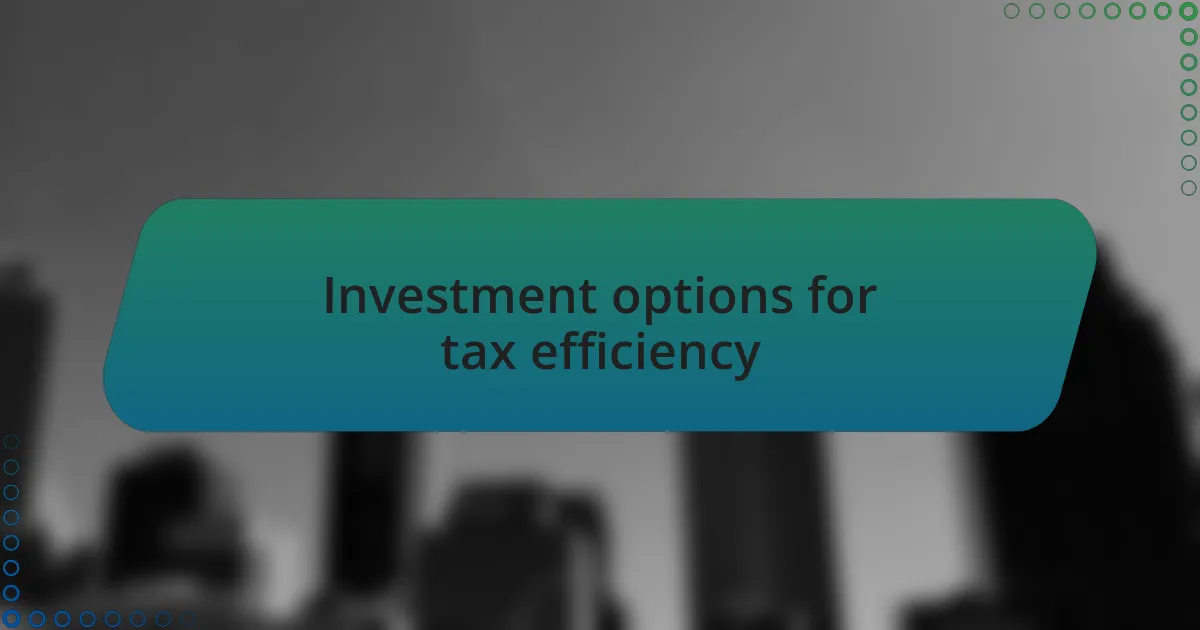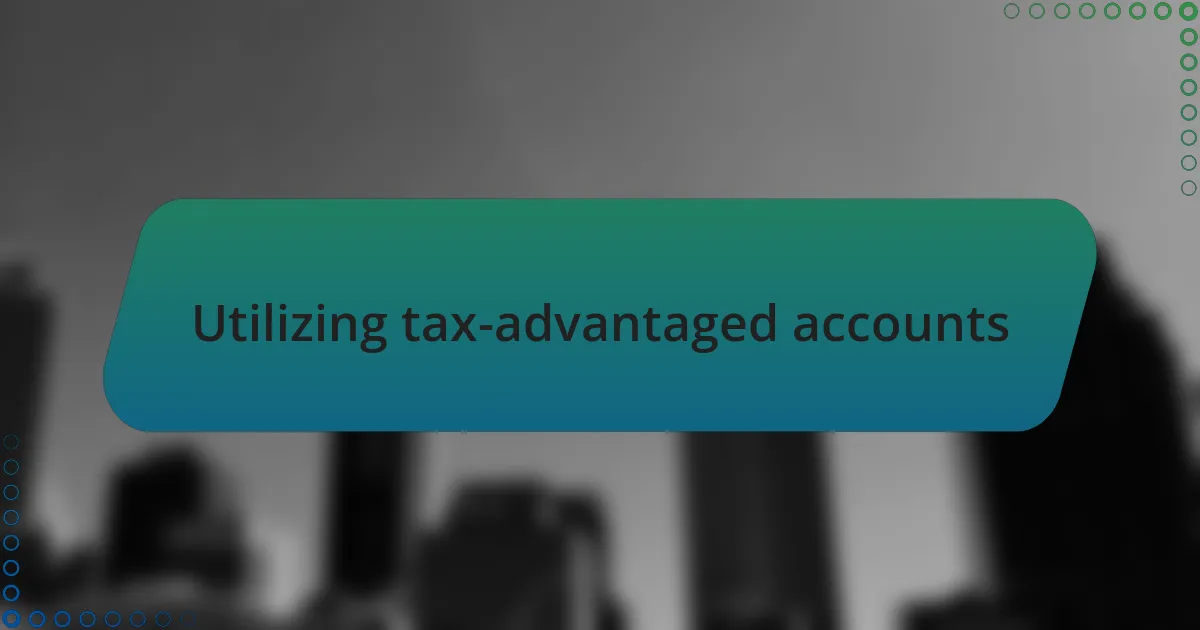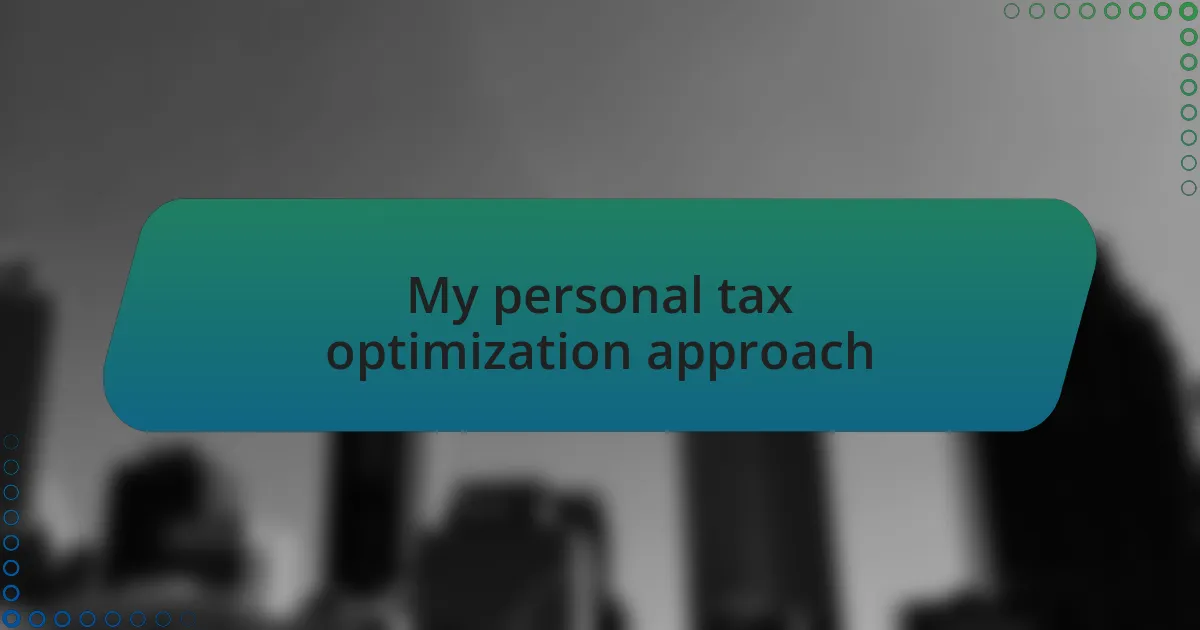Key takeaways:
- Utilizing tax-deferred accounts like 401(k)s can significantly reduce taxable income and enhance long-term financial growth.
- Active exploration of deductions and tax strategies, such as tax-loss harvesting, can uncover hidden savings that improve financial health.
- Investing in tax-efficient options like municipal bonds and index funds helps minimize tax exposure and maximize returns.
- Maintaining diligent record-keeping and seeking out tax credits can lead to significant savings during tax season.
Understanding tax optimization
Understanding tax optimization is about leveraging the tax code to legally minimize the amount you owe. From my own experience, I’ve realized that small adjustments can lead to significant savings. Have you ever thought about how many deductions you might be missing out on each year?
One of the most enlightening moments for me was discovering tax-deferred accounts. Utilizing these not only allowed my investments to grow without being taxed immediately but also helped me plan for future expenses more effectively. I often wonder how many individuals overlook such tools, not realizing the potential impact on their overall financial strategy.
Tax optimization isn’t just about numbers; it’s also a mindset. It’s about being proactive rather than reactive, a philosophy I’ve embraced over the years. When I shifted my focus to planning ahead, the peace of mind that came with knowing my finances were set for the long term was truly liberating. How often do we take the time to re-evaluate our financial strategies to ensure we are optimizing our tax position?

Importance of tax optimization
Tax optimization is critical because it directly impacts your overall financial health. I once met someone who diligently saved each month but wasn’t maximizing their tax benefits. Their reaction when I explained how certain strategies could enhance their savings was enlightening; they realized tax optimization could increase their investments significantly over time. How many people could be in a similar situation, unknowingly stunting their financial growth?
Moreover, the right tax strategies can often transform a stagnant portfolio into a thriving one. I remember implementing tax-loss harvesting during a down market, which not only minimized my tax liability but also allowed my investments to rebound without the weight of previous losses. Are investors fully aware of how such strategies can rejuvenate their financial outlook?
Finally, I’ve come to see tax optimization as a personal responsibility towards my financial future. It’s not merely an annual task but an ongoing process that fosters resilience against economic shifts. Every time I review my tax strategies, I feel empowered, knowing that I’m actively engaging in my financial well-being. Isn’t it inspiring to think about how being informed and strategic can open doors to new possibilities?

Strategies for effective tax planning
Looking at effective tax planning, one of the first strategies that comes to mind is the importance of tax-deferred accounts. I still remember the relief I felt the first time I contributed to a 401(k). By deferring my tax burden, not only was I saving for retirement, but I was also reducing my taxable income for that year. It’s remarkable how such a simple decision can yield significant long-term benefits. Have you considered how much you could potentially save if you’re not taking full advantage of these accounts?
Another strategy I find invaluable is utilizing deductions meticulously. I recall a year when I meticulously tracked my expenses related to charitable contributions and business use of my home. The extra effort paid off with a sizeable deduction that I wasn’t even aware I was eligible for. It makes you think: how many deductions are simply slipping through the cracks in so many budgets? Understanding these nuances can lead to discovering hidden savings that enhance cash flow.
Finally, let’s not underestimate the power of capital gains strategies. Shifting my investments to focus on long-term holdings has not only provided compelling growth over time but has also kept my capital gains tax lower due to reduced rates. I often ponder how this tactic alone can shift an investor’s mindset from short-term gains to building a sustainable future. Could a longer investment horizon be your missing link to effective tax planning?

Investment options for tax efficiency
When it comes to investment options for tax efficiency, one often-overlooked gem is municipal bonds. I remember the first time I invested in them; the relief of knowing my interest earned would be exempt from federal taxes was exhilarating. Have you ever considered how such investments could complement your overall investment strategy while lowering your tax exposure?
Another great option is investing in index funds, which typically generate fewer taxable events due to lower turnover rates. Initially, I was drawn to their simplicity and cost-effectiveness, but what really won me over was the tax efficiency. It’s a solid reminder that sometimes, the simplest choices can lead to better returns, both in terms of performance and peace of mind.
Lastly, I can’t stress the potential benefits of Health Savings Accounts (HSAs) enough. When I started contributing to an HSA for medical expenses, I was pleasantly surprised to discover that contributions are tax-deductible, withdrawals for qualified medical expenses are tax-free, and any other growth is also tax-free if used eventually for medical costs. Could this triple tax advantage be the underrated strategy you’ve been missing in your investment plan?

Utilizing tax-advantaged accounts
There’s something truly special about utilizing tax-advantaged accounts like Roth IRAs. When I first discovered that my contributions could grow tax-free, I felt a surge of excitement knowing my hard-earned money could work harder for me in the long run. Have you ever considered how a Roth can not only provide tax-free withdrawals in retirement but also offer flexibility if you need to access your contributions early?
Then there’s the allure of Traditional IRAs, where upfront tax deductions can provide immediate relief. I remember the year I realized how much I could save during tax season, which immediately put a smile on my face. By reducing my taxable income now, I could invest more, and it’s a strategy that aligns with long-term wealth-building. Could this tactic also help you manage cash flow while still building your retirement nest egg?
One of my personal favorites is the 401(k), especially when my employer offered a match. The thought of getting “free money” was hard to resist and made me eager to contribute more. Have you ever thought about how that employer match can significantly boost your retirement savings with minimal effort? It’s a win-win, creating an invaluable opportunity to optimize your tax situation while securing your financial future.

My personal tax optimization approach
One aspect of my tax optimization approach is diligent record-keeping. I recall a time when I meticulously organized my receipts and financial statements, only to realize I had overlooked several deductible expenses. It was a lightbulb moment that taught me the importance of staying on top of my finances. Have you ever thought about how simple documentation could lead to significant savings come tax season?
In addition to tracking my expenses, I actively seek out tax credits. There was a year when I discovered the child tax credit just in time, which made a noticeable difference in my tax liability. It felt rewarding knowing that my efforts to research and understand the tax laws directly impacted my family’s financial situation. Could finding the right credits also ease your financial burden like it did for me?
Moreover, I believe in the power of strategic charitable contributions. Once, I donated to a cause close to my heart and received a sizable deduction. Not only did I feel fulfilled giving back, but I also saw my taxable income decrease. Have you thought about how aligning your values with your investment strategy can create a positive ripple effect on your tax bill?





